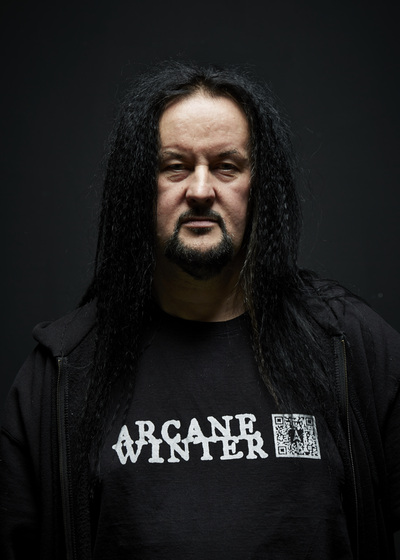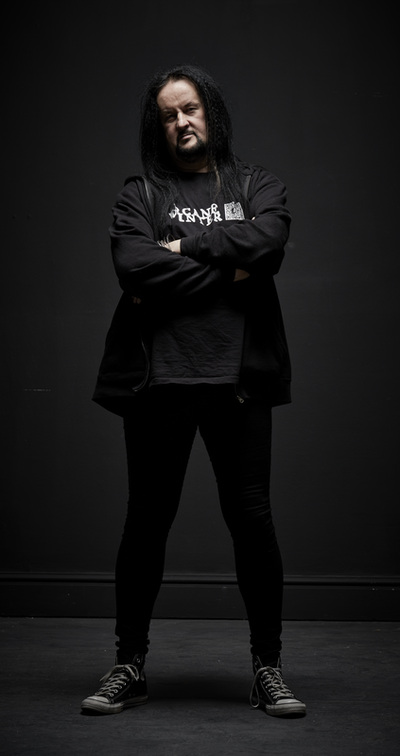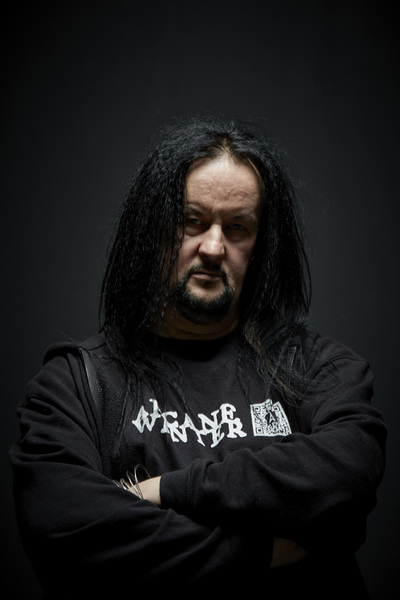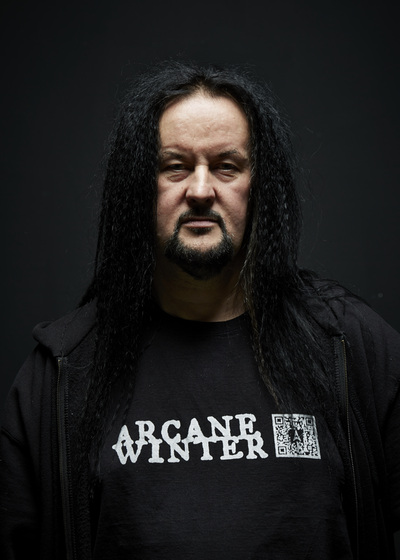On this page you will find a collection of press articles associated with Nightbreed. More will be added as time goes by.
This is a recent interview I did with BA Media student Josh Tolley for his profile assignment.
"The lighter side to the Dark Lord of Nottingham"
Trevor Bamford or the Dark Lord as he has come to be known is a gothic rock musician who has spent most of his life in Nottingham. But where did it all start? I met him recently to ask him how his remarkable career began.
So Trevor, when and where were you born and where did you grow up? “Okay, I was born in a little village called Tiddington, just outside Stratford-Upon Haven in 1960” He then went on to explain how he was born just outside of an RAF base as his father worked for the RAF and that he and his family moved around quite a bit when he was younger. “When I was about 4 or 5, my dad moved back to Nottingham and the first house we got was actually in Clifton, not far from the college I taught you at ironically enough” “I spent the first two years in Nottingham, in Clifton, but then I moved to Aspley when I was 7 and spent most of my childhood growing up there in the Aspley council estate and then moved out to Kimberley until I was 21 and left home” he then said.
I wanted to know about his earliest memories with music. He said that his parents’ involvement with it was simply through television light entertainment shows they watched such as the Val Doonican Show, Lulu and the Des O’Connor Show, very mainstream. He remembers thinking “This stuff is music? Well I bloody well hate it, it’s crap!”.
As he’s now an experienced musician, Trevor had to have been influenced by something, or someone, if not his parents’ taste in music. He discovered heavy rock/metal music with Black Sabbath and Hawkwind opening his eyes to a whole new world, more of which below. He eventually bought his first electric guitar.
Eventually he formed his first band when he was 20 or 21.
I wondered what were the first single and album he bought. The single was “The Wild One by Suzie Quatro” and he played it “about twenty billion times”. The album? “Mott by Mott the Hoople”. It’s still one of his favourite albums, even now. “There’s not a bad track on it”. What are the memories brought back by listening to them both now? “Me being 15 to 16 and learning, listening and being taken somewhere else, to a world that wasn’t Aspley or Kimberley”.
Back to his main influences - “I can be very specific about this, two bands, Black Sabbath and Hakwind” He mentioned how those were the bands that really “Turned his life around”. He spoke about why they influenced him so much and speaking about Black Sabbath, he said “Nobody did music like that. Nowadays, every band in the world owes a debt to Black Sabbath because they were pioneering music in c standard and the music was heavy. It was low, it was deep and their lyrics, subject matter. Black Sabbath were the darkest thing in music, full stop” Regarding Hawkwind and why they influenced him so much “Hawkwind by counterpoint were a space rock band and I was very much into science fiction and horror, which you can basically put down to Black Sabbath and Hawkwind. So really for me, I was looking for music that sang about other things other than he loves, she loves, they love, they can walk hand in hand” He said that there’s nothing wrong with those sorts of songs “But I wanted songs that were a bit more deeper and a bit more gravitas, more so, I wanted the music to take me somewhere and one thing Hawkwind definitely does is take you somewhere”
He explained that Black Sabbath and Hawkwind were how he got interested in playing music and how he bought the Sabbath album Masters of Reality and the Hawkwind album Doremi and thought “I reckon I can do this”. He said that he’d already tried learning to play the guitar when he was 14 and gave up because he wasn’t really interested in guitars as such “But when I heard that, I wanted to play that kind of music”
That was nearly forty years ago, so what bands is he currently in? His answer was that he was in two main bands at the moment, “One would be Arcane Winter and the other would be Death Party UK”. He added that one of his bands Death Party UK had just released a new single and that he and both Death Party UK and Arcane Winter were working on an album to be released later this year by early summer.
To conclude the interview, I asked where he saw himself in five years’ time music-wise. “The music I play for Arcane Winter and Death Party UK is very physical and one of the concerns I have and everybody has is that when they get older, your muscles get tired” He then went on to say “I do worry that I’m not going to be able to physically play the music that I’m playing now”. He added finally that he’s doing “As much now as I can because what I’d like to see in five years time is me continuing”
Let’s all hope his album is a success and that ‘The Dark Lord’ keeps on making music for the foreseeable future.
Profile piece by Joshua Tolley 21/1/15
"The lighter side to the Dark Lord of Nottingham"
Trevor Bamford or the Dark Lord as he has come to be known is a gothic rock musician who has spent most of his life in Nottingham. But where did it all start? I met him recently to ask him how his remarkable career began.
So Trevor, when and where were you born and where did you grow up? “Okay, I was born in a little village called Tiddington, just outside Stratford-Upon Haven in 1960” He then went on to explain how he was born just outside of an RAF base as his father worked for the RAF and that he and his family moved around quite a bit when he was younger. “When I was about 4 or 5, my dad moved back to Nottingham and the first house we got was actually in Clifton, not far from the college I taught you at ironically enough” “I spent the first two years in Nottingham, in Clifton, but then I moved to Aspley when I was 7 and spent most of my childhood growing up there in the Aspley council estate and then moved out to Kimberley until I was 21 and left home” he then said.
I wanted to know about his earliest memories with music. He said that his parents’ involvement with it was simply through television light entertainment shows they watched such as the Val Doonican Show, Lulu and the Des O’Connor Show, very mainstream. He remembers thinking “This stuff is music? Well I bloody well hate it, it’s crap!”.
As he’s now an experienced musician, Trevor had to have been influenced by something, or someone, if not his parents’ taste in music. He discovered heavy rock/metal music with Black Sabbath and Hawkwind opening his eyes to a whole new world, more of which below. He eventually bought his first electric guitar.
Eventually he formed his first band when he was 20 or 21.
I wondered what were the first single and album he bought. The single was “The Wild One by Suzie Quatro” and he played it “about twenty billion times”. The album? “Mott by Mott the Hoople”. It’s still one of his favourite albums, even now. “There’s not a bad track on it”. What are the memories brought back by listening to them both now? “Me being 15 to 16 and learning, listening and being taken somewhere else, to a world that wasn’t Aspley or Kimberley”.
Back to his main influences - “I can be very specific about this, two bands, Black Sabbath and Hakwind” He mentioned how those were the bands that really “Turned his life around”. He spoke about why they influenced him so much and speaking about Black Sabbath, he said “Nobody did music like that. Nowadays, every band in the world owes a debt to Black Sabbath because they were pioneering music in c standard and the music was heavy. It was low, it was deep and their lyrics, subject matter. Black Sabbath were the darkest thing in music, full stop” Regarding Hawkwind and why they influenced him so much “Hawkwind by counterpoint were a space rock band and I was very much into science fiction and horror, which you can basically put down to Black Sabbath and Hawkwind. So really for me, I was looking for music that sang about other things other than he loves, she loves, they love, they can walk hand in hand” He said that there’s nothing wrong with those sorts of songs “But I wanted songs that were a bit more deeper and a bit more gravitas, more so, I wanted the music to take me somewhere and one thing Hawkwind definitely does is take you somewhere”
He explained that Black Sabbath and Hawkwind were how he got interested in playing music and how he bought the Sabbath album Masters of Reality and the Hawkwind album Doremi and thought “I reckon I can do this”. He said that he’d already tried learning to play the guitar when he was 14 and gave up because he wasn’t really interested in guitars as such “But when I heard that, I wanted to play that kind of music”
That was nearly forty years ago, so what bands is he currently in? His answer was that he was in two main bands at the moment, “One would be Arcane Winter and the other would be Death Party UK”. He added that one of his bands Death Party UK had just released a new single and that he and both Death Party UK and Arcane Winter were working on an album to be released later this year by early summer.
To conclude the interview, I asked where he saw himself in five years’ time music-wise. “The music I play for Arcane Winter and Death Party UK is very physical and one of the concerns I have and everybody has is that when they get older, your muscles get tired” He then went on to say “I do worry that I’m not going to be able to physically play the music that I’m playing now”. He added finally that he’s doing “As much now as I can because what I’d like to see in five years time is me continuing”
Let’s all hope his album is a success and that ‘The Dark Lord’ keeps on making music for the foreseeable future.
Profile piece by Joshua Tolley 21/1/15
The Left Lion Magazine. October 2014 Interview with Trev
- What is Nightbreed?
If I was to play you a song from each of these genres would you be able to tell which genre it was from?
Yeah, in a second. I’m a lecturer in music technology, my specialism was the history of music as well as composition and production engineering, so I can literally identify genres in a matter of seconds. I can probably tell you the influences that went in to it and which bands were influential in the development of that particular sub genre.
Are you able to sum up what being a goth means?
There are lots of interpretations, but I think it comes down to a love of the music, the culture, the literature, the fashion, and an open mind to things of that ilk. You get people in the scene who just love the clothes and dress a particular way; you get people who don’t look anything like that but know the music A to Z; then you get people just in to the literature. There are lots of authors in the gothic scene producing fiction and non-fiction. I have been in several books, both as a character and several about the gothic scene. There are lots of parallels with heavy metal, I know a lot of people in the gothic scene would throw their hands up at that, but it’s true. Rob Zombie said that he didn’t choose to be the weird kid in the class, it just happened, and I suppose that is true about the gothic scene. There are lots of people around the world who didn’t fit in to normal society in varying degrees and were attracted to alternate and alternative views that were prevalent within the scene. That’s the most succinct answer that I can give you. There are people who might say that I have to wear black and make-up all of the time. That’s fine, I don’t wear make-up anymore, but I did for a number of years.
How did Nightbreed start?
Back in 1991 I was in a gothic post-punk band called Every New Ghost and I picked up loads of contacts in the global gothic underground because I toured Germany and Europe regularly. I decided to put out a compilation album called New Alternatives because a record label agreed to fund the project. I was unemployed so did it on Enterprise Allowance. The album came out, but because I was a young man I didn’t realise that you had to pay for promotion. You had to oil the wheels of industry with money and I didn’t have it and therefore couldn’t afford to buy the reviews that were necessary to launch the product. Long story short: the album came out and died. What happened next was very interesting; the album came out, didn’t sell a massive amount, but the people who bought it were all over the world. They would write to me asking if they could buy something by a band on the compilation, and I would write back telling them to contact the band directly. The penny finally dropped and I thought, why don’t I sell their merchandise and make some money? That’s how Nightbreed started. I set it up selling demo tapes, cassette released albums, and records; and gradually built it up over a period of years. All of the money that came in went back in to developing Nightbreed.
In the mid-nineties it was fairly large, we had premises on Wollaton Street that had a recording studio, shop and an office, as well as a unit in Sneinton Market. We built it up to quite a big thing. The record label has released fifty-odd albums so far. Towards the end of the nineties, with the advent of MP3s and CDr burning, it wiped out our niche market. I couldn’t afford to run it anymore, sold everything off, kept the studio for a little while, and kept the rights to the record label. After that, we set up our own social networking site years before Facebook, the Church of Nightbreed. It worked well for some time, but because I didn’t have the technical skills to run it, that too went in to decline. Nightbreed effectively became a name for a particular paradigm that is prevalent within the gothic subculture. To be a Nightbreed person was to have certain values and views, which some people agreed with and certain people didn’t, but Nightbreed has always been there as a support network. What the gothic scene and Nightbreed sussed out early on is - if you are truly underground then you have to embrace that complete countercultural stance. A lot of music scenes don’t have that yet. Once you embrace the fact that you are truly counterculture, the next thing you have to do is rebuild but from a countercultural view, and that view is exemplified by John Lydon singing with the Sex Pistols, “You use the best, I use the rest”. We can’t access the mainstream press because we can’t afford to buy the press, therefore we have to do it other ways. The gothic scene was the first scene to do this and it’s continued.
What are Nightbreed’s values and views?
It’s open-ended: if you were to talk to six different people about what they were you would get six different answers. It can be encapsulated by an aggressive moving-on stance; don’t forget your past, but move on. Although I will be honest with you, there are people in the gothic scene who only want to know about the eighties, The Cure and bands of that ilk. Equally, there are people who do not want to know about those bands because they are old fashioned. Then there are people on top of that who don’t want to know about any of those band because they are in to electroclash. The way to see the gothic scene is like a tree with loads of sub-branches, and all of it is countercultural and not known by the mainstream. Nightbreed’s views are to move on, promote, help and to keep the fire burning.
Nightbreed has a global reach, but what’s the Nottingham goth scene like?
There are lots of people who are doing different things. There’s the Dirty Filthy Sexy crowd, they put on regular nights and bands as well as the annual Darkwaters Festival at The Boat Club. You have the Nightmare nights, which is more towards the electronic side of things. The Cookie Club has Spellbound. Events in Beeston at The Greyhound. There are also intermittent other nights set up by other people. Nighbreed doesn’t put on nights in Nottingham anymore. We still do the odd digital and physical release, but the radio station is our main focus as it is global and bands can get listened to by a large audience. Really, the Nottingham gothic scene has lots of different factions. There are also the different shops - Deviant Angel in Victoria Centre, there’s Void, and the mail order services. The scene is there, but there are lots of disparate things.
What was the Nottingham goth scene like back when you started Nightbreed?
Nightbreed was set up in 1990-91 and there were several bands – my band, Every New Dead Ghost, Die Laughing, The Blood Relatives, Broken Faith, Tabitha Zoo. By the mid-nineties it was a different set of bands. We didn’t play much in Nottingham, but played Rock City whenever they had a gothic night, the Garage that later became the Kool Kat, The Rig. We played most of the venues in Nottingham including the International Community Centre, Russell’s (now The Orange Tree), and The Yorker (now The Rose of England).
Is goth marginalised in Nottingham?
It’s always been marginalised. The term ‘goth’ was originally meant as an insult. Back in the mid-eighties punk rock was still the dominant countercultural force. On one hand you had punk as a way of life exemplified by The Exploited, Discharge, GBH. Then the other side had Crass, Poison Girls, Amebix, Flux of Pink Indians. Anything else that fell outside of that was termed ‘alternative’ and that scene evolved in to what we now term the gothic scene. In 1988 - I can put a date on it - the tide changed and the general consensus is that there was a concerted effort by mainstream media to demonise the gothic culture in order to sell young people a new culture. In other words, they had sold enough winklepickers and black clothes and wanted to sell other items. The gothic scene dropped from view, literally overnight. Suddenly your gigs weren’t mentioned in the mainstream press, you weren’t reviewed, featured, or played on the radio. Through its marginalisation and self-realisation it became a genuine underground scene, but it has survived and will continue to survive in one form or another. One of the aspects of the gothic scene is that it’s global, underground and countercultural.
If I was to turn on Nightbreed Radio in the morning what would I hear?
We have jingles and one of them says something like, “If you wanted to hear about the traffic news, quite frankly we don’t give a damn.” It’ll be a mixture of gothic and gothic involved music new and old. The shows are updated once or month and the random playlists are updated when I get around to it. You generally don’t hear the Sisters of Mercy. A lot of the DJs are Nottingham based, my show is called the Darklord Radio Hour and Piers, from my band Arcane Winter, does a show.
Tell me about Arcane Winter...
We’ve been around for three years now and released three digital EPs. We are working on our full length album. I have my own studio, Nightbreed Recording Studio, in my house. That’s where I do my shows and I do bits and pieces for others bands such as mastering. My side-project is a gothabilly project called Death Party UK.
Do you get to gig around Nottingham?
Death Party haven’t done many shows. We did a live show on the internet. Arcane Winter gig quite a lot. We don’t just play with gothic bands, the music we make is more post-punk influenced, but it has gothic connections. We are probably closer to bands like Killing Joke and Ministry.
Who are the other local goth bands?
There’s my side-project, The Death Notes, who are based in Beeston. In Isolation who are more towards the indie-goth crossover side of things. Luxury Stranger who are again indie-goth but with a different take. Renoized, who make distorted beats and are electronic. That is off the top of my head, there are others who I’ve probably forgotten. There are probably more now than there has been for a while.
What would you do to me to goth me up?
To tell you the truth, I would do nothing. Everyone has their own views on it. I don’t want to start bitching about people, but Tim Burton and his take on the gothic scene is very halloweeny and twee. That’s great and it has its place but I don’t relate to that. For me it’s more about the music that you like, the attitudes that you have, and you tend to find that your images and clothes will follow from what is inside. I don’t believe in a makeover, that is fake. I’ve looked like this for thirty years and I’m happy with that. I take Aleister Crowley’s point of view, “Do what thou wilt shall be the whole of the law”. I also take Ayn Rand’s view that the ultimate maxim in life should be the pursuit of your own happiness but not at the expense of others.
Siouxise Sioux - GOTH
Marilyn Manson - NOT
Lorde - NOT
Robert Smith - GOTH
Edward Scissorhands - NOT
Edgar Allan Poe - GOTH
Grotbags - NOT
Trent Reznor - NOT
The kids who hang in the Market Square - NOT
H.P. Lovecraft - GOTH
LIsten to the Sound of the Lion: Goth Special - a podcast featuring a selection of Nottingham goth bands past and present.





